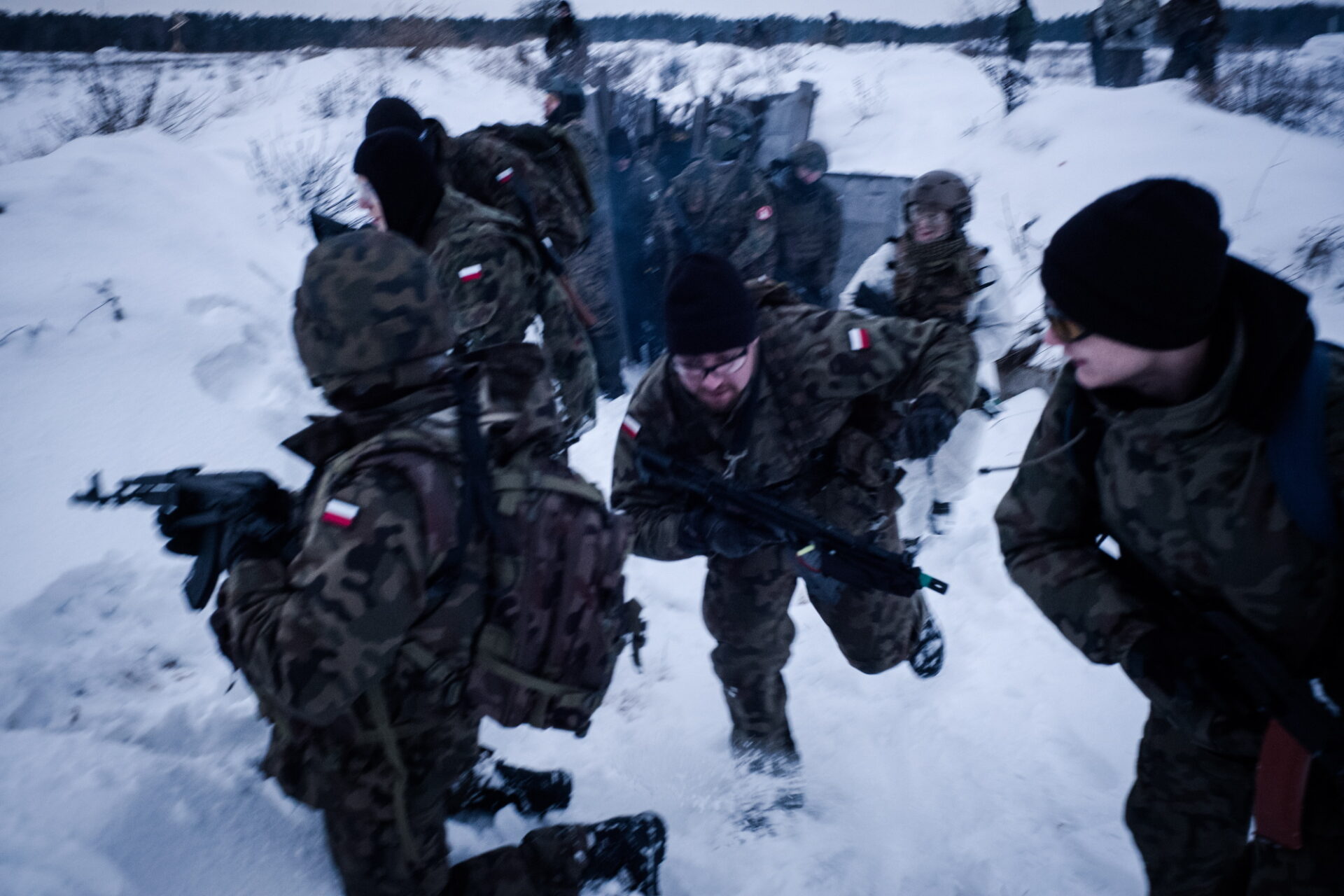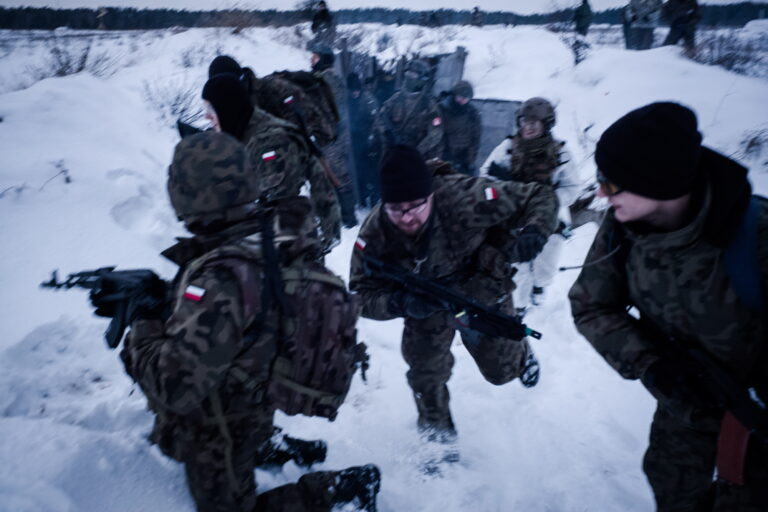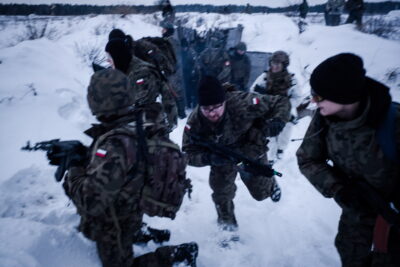For almost 10 years, the Polish Ministry of Defense has been trying to attract non-governmental organizations to help promote ‘patriotic and pro-defense attitudes’. With the PiS government, golden days have come for pro-defense organizations: money, privileges and even exercises with American soldiers.
November 2018. Orzysz training ground in north-eastern Poland. A battalion of the 12th Mechanized Brigade is moving from its headquarters to a training ground close to the Russian border, just several dozens of kilometers away. Before it reaches Orzysz, the surrounding area is secured by pro-defense units – they put up posts, send out patrols and put out guards. The enemy is at the gates.
This is the beginning of an exercise scenario prepared for last year’s maneuvers Anaconda’18, attended by pro-defense organizations. The November military maneuvers are one of the biggest recurring military exercises in this part of Europe. They are held every two years – last year they were attended by approximately 12.5 thousand soldiers, of which 5 thousand came from the Baltic States, on land and at sea.
327 members of pro-defense organizations trained together with the soldiers. They came from 24 organizations. The biggest team of 43 members was entered by Fideles Et Instructi Armi (Faithful, Ready and Armed), an organization closely collaborating with the MoD.
As VSquare has already reported, organizations involved in Anaconda’18 had been chosen in a special training program called Passport. During the Passport training, the Office for Pro-Defence Organisations of the Polish ministry checked how well prepared they were: their level of training, weaponry and experience in field actions. Invitation to participate in military maneuvers is a privilege for pro-defense organizations and a proof that the ministry is focusing on cooperation with uniformed civilians.
But the allies did not like the fact these organizations were invited to the Anaconda exercises. The US army, whose many soldiers took participated in it, had expressed concerns about the involvement of civilians in the maneuvers already at the 2016 edition of the exercises.
When the Americans learned of plans to include paramilitary groups in the Anaconda, a representative of the American attaché office communicated their objections to director Waldemar Zubek. As reported by the Rzeczpospolita daily, Americans were particularly concerned because civilians are not allowed in close proximity of military exercises involving American soldiers. Not to mention training side by side with Americans, which is out of the question.
In the end, however, pro-defense organizations did take part in Anaconda’16. And the three organizations: ObronaNarodowa.pl, Fideles Et Instructi Armi (Faithful, Ready and Armed), Legia Akademicka to be included in the exercises were joined by another one, called the Riflemen Association, just before the start of the maneuvers. To avoid controversy, their members were positioned so as not to have contact with American troops.
Consent for pro-defense organizations to take part in the exercises was given by the then minister of defense Antoni Macierewicz. The Supreme Audit Office asked the Ministry of Defense about that, interested to know if the meeting of pro-defense organizations with a representative of the American attaché office had been notified to Polish counterintelligence. But the ministry did not reply.
In addition to the objections voiced by allies, doubts have been raised by the ostensible vetting of participants by counterintelligence. An ex-officer of the Military Counterintelligence Service has spoken about it in an interview for VSquare: “Plenty of young people were hired by the military counterintelligence recently. Some of them come precisely from those rightist paramilitary organizations. I think this is one of the reasons why those checks have to be treated with a pinch of salt. Solid vetting of those groups takes long and painstaking work, and the present government wants to be on good terms with them. And they are.”
Another expert adds: “The military has its own procedures for checking soldiers’ health, psychological and criminal record. To become a soldier, you have to meet a number of requirements and undergo certain examinations and psychological testing. Meanwhile, members of the paramilitary organisations are not checked in any way.”
Falanga at the Anaconda
The concerns proved to be justified. In June 2016, pro-defense organizations including riflemen from a Kraków-based organization Jednostka Strzelecka 2039 brag on social media about going to Anaconda’16. Jednostka 2039 is to follow a scenario laid out by the military: defend a dam at Solina which terrorists threaten to blow up. With a dam and a power plant in one, the facility is strategic for the safety of the region. Its location is critical too – it was built in Podkarpacie, in south-eastern Poland, close to the border with Ukraine and Slovakia.
Some activists of Jednostka 2039 (SJS 2039) were also members of Falanga – a radical right-wing organization drawing on the tradition of a pre-war, nationalist and anti-Semitic National-Radical Camp Falanga. It is characterized by animosity against the United States and NATO, and admiration for Putin’s policies.
Former activists of SJS 2039 have a record of multiple anti-NATO and pro-Russian actions. Falanga supporters from SJS 2039 have organized anti-Bandera patrols on the Polish-Ukrainian border. They have visited the separatist Donetsk People’s Republic to meet with its leaders, burnt NATO flags and shouted anti-Semitic slogans at rallies in front of the U.S. embassy.
The exercises at Solina attended by Falanga riflemen are watched by officials from the ministry of defense, the deputy head of prime minister’s office Paweł Szrot and local government officials. Later, the ministry will explain that those maneuvers were not part of the Anaconda, but were ‘Regional Defense Exercises taking place at the same time’. And they were organized by the Voivode of Podkarpacie. This does not change the fact that the pro-defense organizations training hand in hand with the military got to know the infrastructure of the dam and its safeguards from the inside.
One of the commanders of SJS 2039, who took part in anti-NATO and pro-Russian actions was an organizer of an arson attack on a Hungarian centre in Uzhhorod – Michał P. (for more read here). And the arsonist was Adrian M., a former member of SJS 2039. In November 2018, the Falanga activists were accused by the prosecutor’s office of committing a terrorist crime. Portal TVP Info has seen the investigation documents, which show that Michał P. allegedly sought several other members of SJS 2039 to take part in the arson.
SJS 2039 is responsible to the Riflemen Association Strzelec from Rzeszów, the official patron of which is the Polish ministry of defense. In September 2016, the Military Property Agency lent a military property in Kraków to SJS 2039. The national Intelligence Agency is one of the sponsors of the association’s banner. Riflemen from SJS 2039 can be seen at a number of events and parades attended by ministry and local government officials.
Józef Piłsudski Riflemen’s Association Strzelec, under the auspices of which 2039 SJS operated since 2015, got a total of 20,1 thousand euro from the ministry’s budget for pro-defense organizations. 12 riflemen from the Rzeszów association took part in Anaconda’18.
We have asked the Polish ministry of defense if the civilian participants of the Anaconda exercises in 2016 and 2018 had been vetted before the events, to prevent those involved with organizations such as Falanga from taking part in the maneuvers. What did the vetting consist of and who carried it out? The Press Office replied laconically: ‘Everyone qualified to participate in the AN-18 exercise had been reported for vetting by the Military Counterintelligence Service. Moreover, the Office for Pro-Defense Organizations collaborates with the Military Counterintelligence Service on an ongoing basis, one of the purposes of that collaboration being the vetting of pro-defense organizations to be qualified for the Passport program’.
Polish combat system
Another organization with a pro-Russian touch, called Polish Close Combat System Haller, cooperated with SJS 2039 based in Kraków. PSWW Haller is the name of a combat system for the uniformed services, soldiers and members of pro-defense organizations developed by Polish martial arts instructors. The name was derived from the surname of general Józef Haller, one of the most important Polish military commanders in World War I.
PSWW Haller organizes regular workouts, and has branches throughout Poland. In 2015, the Kraków branch was run by SJS 2039.
PSWW Haller is led by Tomasz Formicki. He is the founder and creator of the organization. Until 2018, also the owner of a security company Armare operating in Warsaw, at the same address as PSWW Haller.
On 25 September 2014, Formicki is a guest of a panel entitled Human Rights in Ukraine after the Maidan, organized at an OSCE conference in the Victoria Hotel in Warsaw. As Marcin Rey reported on his Facebook page Russian Fifth Column in Poland, the conference was also attended by Konrad Rękas and Tomasz Jankowski – close associates of Mateusz P., a former leader of the pro-Russian party Zmiana (Change), accused of spying for Russia and China (for more about Mateusz P. read here). The conference is also attended by Jan Engelgard. He is the editor-in-chief of a right-wing magazine Myśl Polska (The Polish Thought) and the head of the X Pavilion of the Warsaw Citadel Museum, an author publishing in Sputnik News. Formicki and Engelgard also write for geopolityka.org, a portal once owned by a think-tank called European Centre of Geopolitical Analysis, founded by Mateusz P.
Formicki invites Engelgard to collaborate with PSWW Haller. In February 2014, Engelgard gives a lecture at a training organized by PSWW in a secondary school in Urle, in a uniformed class. He is presented with a commemorative statuette for his support for PSWW Haller. On the website of the magazine run by Engelgard there are announcements about camps organized by PSWW Haller.
Another author writing for The Polish Thought is Mateusz Kaim – director of the office of PSWW Haller. The 23-year-old is a former chairman of the Geopolitics of Information Security Research Club at the War Studies University – the biggest public military university in Warsaw. A student organization holds a conference in April 2016. It is entitled: ‘Disintegration operations in the process of division of the Ukrainian state (Maidan), the Russian school of information warfare and its applications in the Crimean operation’. Conference speakers include: Tomasz Formicki from PSWW Haller, Prof. Andrzej Zapałowski, a pro-Russian activist, former member of the European Parliament and member of CIS-EMO observation missions in Ukraine in 2010 (CIS-EMO is an organization that was run from Poland by Mateusz P. – it would send politicians and researchers to states in the territory of the former Soviet Union to take part in election observation missions for Kremlin money. Its purpose was to legitimize elections that were held with violation of electoral rights). One of the scheduled guests of the conference is also general Wiesław Kukuła – the present commander of Territorial Defence Forces.
Mateusz Kaim and Tomasz Formicki sit on the governing bodies of Institute of Information foundation, an organization operating in Warsaw since February 2013. Until August 2016, Marcin Domagała, an activist of the pro-Russian party Zmiana was also the Vice President of the Board of the Institute of Information. On its website, the Institute boasts about its collaboration with the Regional Inspectorate of Penitentiary Service in Warsaw.
But the most important project of the Foundation was the organization of an annual event for pro-defense organizations called Tiger Run, on the training ground in Orzysz. PSWW Haller was the co-organizer of its two editions: in 2015 and 2016. Its partners included 15th Mechanized Brigade in Giżycko, the Training Ground Centre of Ground Forces in Orzysz, the Military Police, 15th Mazurian Sapper Battalion, the Office of the City and Municipality of Orzysz. The military picnic was held under the honorary patronage of the ministry.
How pro-defense organizations grow
In 2009, the Polish ministry of defense discovered that the number of pro-defense organizations had started to grow rapidly. It was then that the rules and objectives of government collaboration with military groups were laid down for the first time. In 2014, the ministry appointed a plenipotentiary for the social matters of pro-defense initiatives. It also took under its wings the newly formed Federation of Pro-Defense Organizations, uniting these organizations. In 2015, the ministry appointed an Office for Pro-Defense Organizations which coordinates cooperation between the organizations and the military, uniformed classes and universities teaching security and defense studies.
From the beginning of his work at the MoD, Antoni Macierewicz focused on closer cooperation of the ministry with pro-defense organizations. The objective was clear – the development of pro-defense organizations, next to Territorial Defence Forces, was a way to promote military and patriotic attitudes among Poles. It was also declared that another goal was to teach skills useful for the country’s defense system. So the ministry pays more and more money for exercises organized by pro-defense organizations, gives access to training grounds, facilities, weapons and military equipment. There are more and more of them every year. The Supreme Audit Office recently examined how this policy works in practice. It turned out that Polish ministry of defense officials cared more about the interests of the organizations than of the state. Maybe because they came from those organizations themselves.
As found by VSquare, the ministry is spending more and more money for subsidies for pro-defense organizations from year to year. In 2014 it was 2 million euros, in 2015 – 2.2 million, in 2016 – 2.7 million, in 2017 – more than 2.8 million euros.
Who gets a subsidy is decided by a committee at the ministry of defense. This is a problem, because although the ministry has been tightening cooperation with the organizations for four years, there is no definition of a ‘pro-defense organization’ in any act. Neither is there a definition of objectives to be pursued by such entities. They operate in a legal limbo.
Among the more than a hundred subsidized organizations three stand out as the most generously endowed by the ministry of defense. In 2016, only those three got a record amount of more than 604,000 euros, one quarter of all the money earmarked for pro-defense organizations.
The first one is an Association of Former Soldiers of the 62nd Special Company Commando from Bolesławiec. Its chairman Lt. Col. Andrzej Żdan was once the commander of the company from Bolesławiec. In 2015, Commando got 111,400 euros, in 2016 – 143,000 euros and in 2017 – 60,800 euros. The association is mainly concerned with organizing sports and defense competitions, maneuvers focused on lifesaving, rallies and anniversary celebrations.
Private businesses
The second organization is the Foundation of Former Soldiers and Officers of Special Forces Szturman, founded in 2009 in Toruń, central Poland. The main purpose of the foundation is to provide social and legal assistance to soldiers. In addition, it also carries out shooting trainings and organizes pro-defense events. These are the purposes for which it got funds. The chairman of Szturman since 2013 is a former commando Sławomir Łazarski.
In 2015, the organization signed two contracts with the ministry for 34,900 euros, and a year later thirteen contracts for a total of 241,000 euros. The money went mainly for military training of young people and the organization of sports competitions for soldiers and those thinking of joining the army.
The Supreme Audit Office which controls government spending, has checked how the ministry cooperated with pro-defense organizations and how those organizations spent public money. The auditors also scrutinized Szturman, and found irregularities in almost each of the 13 tasks. In the first place, the foundation subcontracted tasks to private companies, which was contrary to its agreement with the ministry. What is more, members of Szturman’s governing bodies were the heads or board members of these companies. The private companies received a total of over 37,000 euros. Szturman paid more than 9,000 euros for medical security to a company operating in the construction industry.
‘If you expect material benefits from your work for the Foundation, unfortunately you will be disappointed. We are people who share a passion and a belief that we are doing important things for our country,’ said Łazarski in an interview in 2016.In 2017, Szturman got 161,000 euros. Also in 2018 (aggregated data is not yet available), the general command of the armed forces indicated Szturman as the organizer of dozens of events.
The ministry is eating its own tail
The next organization getting most money from the MoD is Fidelis et Instructi Armis (FIA) – Faithful, Ready and Armed, an association founded in 2012. It is led by Karol Bandurski, a sociologist by education who works at a law firm. Bandurski also sits on the Board of the Federation of Pro-Defense Organizations. In 2015, FIA got 26,000 euros, a year later already 259,000 euros and in 2017 – 190,000 euros. With this money, FIA organized mostly shooting training and tactical workshops. As is apparent from the report by the Supreme Audit Office, like in the case of Szturman, some of the tasks were contracted out to companies owned by FIA’s members of the board, including Bandurski’s company.
The SAO also discovered that FIA had issued invoices to the Parents Council of one of the schools in which the organization taught a military and shooting course for children. Bandurski explained that he did not take money from the people he trained, the children, but from the school.
In addition to Bandurski, on the Board of the Federation of Pro-Defense Organizations sit representatives of several pro-defense organizations, as well as representatives of the ministerial Office for Pro-Defense Organizations. Those same officials took part in the meetings of the committee which granted money to pro-defense organizations. According to the SAO report, director Zubek himself made efforts to ensure that representatives of his office would take part in the work of the committee in 2016. Even though one of the departments warned that it might compromise the impartiality of the committee, Zubek got permission.
According to the Supreme Audit Office (SAO), ‘efforts of the Office were focused more on monitoring and determining the needs of pro-defense organizations and taking action to meet those needs, as well as on promoting the Office itself and some of the pro-defense organizations. This could have been caused by the fact that in dealing with pro-defense organizations the ministry of national defense was represented by officials linked to pro-defense organizations (members or ex-members)’.
Waldemar Zubek comes from a pro-defense organization himself, the Józef Piłsudski Riflemen’s Association. Our reporters met him a couple of weeks ago at the training ground in Orzysz, at Combat Alert exercises. His speech opened the event. However, he told the reporters he had come for the exercises as a private person.
The ministry’s cooperation with pro-defense organizations was supposed to support the minister’s flagship project of building Territorial Defence Forces. In accordance with the assumptions, these organizations could be an element of territorial defense. New regulations give their members priority over other candidates in recruitment for TDF.
It looks, however, that the ministry is eating its own tail. ‘As on 31 December 2017, 6,216 volunteers were recruited for territorial military service, of which 184, ie. less than 3% were members of pro-defense organizations’ SAO found. SAO believes that this was caused precisely by the growing subsidies and tasks assigned to these organizations, ‘offering training opportunities with and at the expense of the army, but without the obligations arising from the fact of being a soldier’. So it turned out that TDF and pro-defense organizations compete for the same people. In the FIA association, out of over 300 members only one asked to be recommended for TDF.
Konrad Szczygieł is an investigative journalist at FRONTSTORY.PL. Previously, he was a reporter at Superwizjer TVN and OKO.Press. Since 2016, he has worked with Fundacja Reporterów (Reporters Foundation). He was shortlisted for a Grand Press award (2016, 2021) and an Andrzej Woyciechowski award (2021). He is based in Warsaw.







